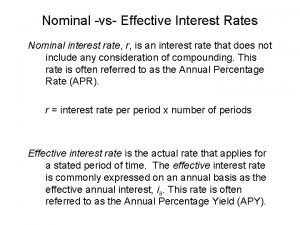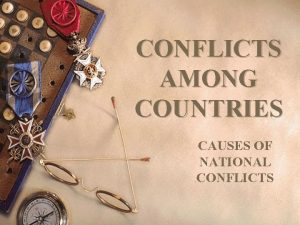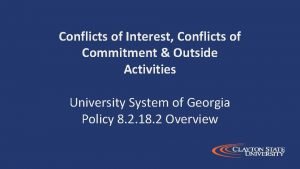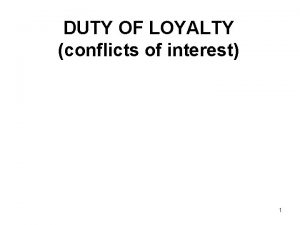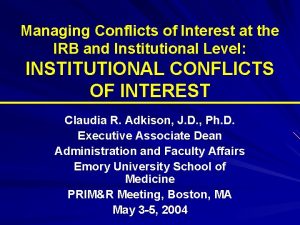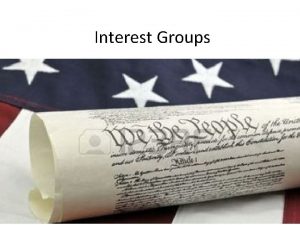Managing Conflicts of Interest in the NHS national


















- Slides: 18

Managing Conflicts of Interest in the NHS' national guidance came into force June 2017 and impacts on all staff working in the NHS. It also includes Governors. The links in the following slides will help you understand what this means for us at Chesterfield Royal Hospital NHS Foundation Trust, what our responsibilities are and what individuals must do. The detail can be found in the Trust’s Managing Conflicts of Interest Policy which is available on the Trust’s internet site https: //www. chesterfieldroyal. nhs. uk/about-us/conflicts-interest All declarations should be made on the declarations of interest form. Click here for the declaration form

Managing Conflicts of Interest For the public: We welcome you to inspect our register which can be found at https: //www. chesterfieldroyal. nhs. uk/about-us/conflicts-interest Click here for the declaration form

Managing Conflicts of Interest For our staff: • Secure register • Declare your interests promptly, within 28 days • Senior staff (our Decision makers) are required to submit an annual return even if it is a ‘nil return’ Click here for the declaration form

Are you a decision maker? Click here to find out more about our decision makers

Gifts Shareholdings Patents Donations Hospitality Loyalty Interests Sponsored posts Sponsored events Outside employment Clinical private practice Sponsored research

Further help and advice A range of questions and answers have been developed by NHS England covering a variety of specific situations either at www. england. nhs. uk/ourwork/coi Clinical Staff Q&A NHS Provider Manager (including Governors) Q&A Medical staff Q&A If you still cannot find the answer you need please email crhft. conflictsofinterest@nhs. net Click here for the declaration form

We all make decisions every day however, some of us are more likely than others to have a decision making influence on the use of taxpayers’ money, because of the requirements of their role. Decision Makers These people are referred to as ‘decision making staff. ’ Decision making staff in this organisation are: • Board of Directors; Executive and Non-executive Directors. • Council of Governors. • Consultants with management roles – i. e Divisional and Clinical Directors. • Those at Agenda for Change band 8 d and above. • Those directly involved in recruitment decisions. Decision making staff need to make an annual declaration, even if there is nothing to declare. More questions Click here for the declaration form

Gifts Can I accept a gift from a supplier or contractor? • Gifts from suppliers or contractors doing business (or likely to do business) with the organisation should be declined, whatever their value. • Low cost branded promotional aids such as pens or post-it notes may, however, be accepted where they are under the value of £ 6 in total, and need not be declared. Can I accept a gift from a patient, their families or other service users? • Gifts of cash and vouchers to individuals should always be declined. • Gifts valued at over £ 50 should be treated with caution and only be accepted on behalf of the Trust, or the Charitable Trust Fund (contact Patient Accounts about how to do this), not in a personal capacity. These should be declared by staff using the Declaration of Interests Form (see link below). • Modest gifts accepted under a value of £ 50 do not need to be declared. How do I know how much a gift is worth? • A common sense approach should be applied to the valuing of gifts (using an actual amount, if known, or an estimate that a reasonable person would make as to its value). What do I do if I’m offered a second or further gift from the same source? • Multiple gifts from the same source over a 12 month period should be treated in the same way as single gifts over £ 50 where the cumulative value exceeds £ 50. More questions Click here for the declaration form

When is it OK to accept any hospitality offered? • Hospitality must only be accepted when there is a legitimate business reason and it is proportionate to the nature and purpose of the event. • Particular caution should be exercised when hospitality is offered by actual or potential suppliers or contractors. This can be accepted, and must be declared, if modest and reasonable. Senior approval* must be obtained. Hospitality What would be considered as reasonable? • A common sense approach should be applied to the valuing of meals and refreshments (using an actual amount, if known, or a reasonable estimate). • • • • Meals and refreshments: – Under a value of £ 25 - may be accepted and need not be declared. – Of a value between £ 25 and £ 75 - may be accepted and must be declared. – Over a value of £ 75 - should be refused unless senior approval* is given and must be declared. A clear reason should be recorded on the organisation’s register(s) of interest as to why it was permissible to accept. Travel and accommodation: Modest offers to pay some or all of the travel and accommodation costs related to attendance at events may be accepted and must be declared. Offers which go beyond modest, or are of a type that the organisation itself might not usually offer need approval by senior staff*; should only be accepted in exceptional circumstances; and, must be declared. A clear reason should be recorded on the organisation’s register(s) of interest as to why it was permissible to accept travel and accommodation of this type. A non-exhaustive list of examples includes: – offers of business class or first class travel and accommodation (including domestic travel) – offers of foreign travel and accommodation. Who will I need to ask for senior approval*? • For the Board of Directors and Council of Governors, senior approval should be obtained from the Chief Executive. • For all other staff, senior approval is to be obtained from the Director of Finance and Contracting. More questions Click here for the declaration form

Shareholdings Which shareholdings do I need to declare? • Staff should declare, as a minimum, any shareholdings and other ownership interests in any publicly listed, private or not-for-profit company, business, partnership or consultancy which is doing, or might be reasonably expected to do, business with the organisation. • There is no need to declare shares or securities held in collective investment or pension funds or units of authorised unit trusts. What action should be taken if a conflict of interest is identified? • Where holding shareholdings gives rise to a conflict of interest then general management actions should be applied for example: – restricting staff involvement in associated discussions and excluding them from decision making – removing staff from the whole decision making process – removing staff responsibility for an entire area of work – removing staff from their role altogether if they are unable to operate effectively in it because the conflict is so significant More questions Click here for the declaration form

Patents What do I have to declare? • Staff should declare patents and other intellectual property (See the Trust’s Intellectual Property Policy) rights they hold (either individually, or by virtue of their association with a commercial or other organisation), including where applications to protect have started or are ongoing, which are, or might be reasonably expected to be, related to items to be procured or used by the organisation. Do I need permission? • Staff should seek prior permission from the Trust through the Senior Matron for Research before entering into any agreement with bodies regarding product development, research, work on pathways etc. , where this impacts on the organisation’s own time, or uses its equipment, resources or intellectual property. What action should be taken if a conflict of interest is identified? • Where holding of patents and other intellectual property rights give rise to a conflict of interest then general management actions should be applied for example: – restricting staff involvement in associated discussions and excluding them from decision making – removing staff from the whole decision making process – removing staff responsibility for an entire area of work – removing staff from their role altogether if they are unable to operate effectively in it because the conflict is so significant More questions Click here for the declaration form

Loyalty Interests What is a ‘loyalty’ interest? Loyalty interests might include: • Holding a position of authority in another NHS organisation or commercial, charity, voluntary, professional, statutory or other body which could be seen to influence decisions they take in their NHS role. • Sitting on advisory groups or other paid or unpaid decision making forums that can influence how an organisation spends taxpayers’ money. • If you are, or could be, involved in the recruitment or management of close family members and relatives, close friends and associates, and business partners. • If you are aware that the organisation does business with an organisation in which close family members and relatives, close friends and associates, and business partners have decision making responsibilities. Do all staff need to declare loyalty interests? • No, loyalty interests only need to be declared by staff involved in decision making. See also ‘outside employment’ and ‘clinical private practice’. More questions Click here for the declaration form

Can a donation be accepted? • Donations made by suppliers or bodies seeking to do business with the organisation should be treated with caution and not routinely accepted. In exceptional circumstances they may be accepted but should always be declared. A clear reason should be recorded as to why it was deemed acceptable, alongside the actual or estimated value. Donations When is it OK to ask for donations? • Staff can only actively solicit charitable donations: – if it is a prescribed or expected part of their duties for the organisation; – being pursued on behalf of the organisation’s own registered charity or other charitable body and is not for their own personal gain. Do I need permission? • Staff must obtain permission from the Trust if in their professional role they intend to undertake fundraising activities on behalf of a pre-approved charitable campaign for a charity other than the organisation’s own. Do I need to give a receipt? • Yes. Donations, when received, should be made to a specific charitable fund (never to an individual) and a receipt should be issued. Can I make a donation in lieu of receiving a professional fee? • Yes. Staff wishing to make a donation to a charitable fund in lieu of receiving a professional fee may do so, subject to ensuring that they take personal responsibility for ensuring that any tax liabilities related to such donations are properly discharged and accounted for. More questions Click here for the declaration form

Outside employment When should I declare any outside employment? • Staff should declare any existing outside employment on appointment and any new outside employment when it arises. • Where a risk of conflict of interest arises, the general management actions outlined in this policy should be considered and applied to mitigate risks. Do I have to seek approval for outside employment? • The Trust may have legitimate reasons within employment law for knowing about outside employment of staff, even when this does not give rise to risk of a conflict. Further information can be found in the Trust’s Secondary / Other Employment Policy which applies to all employees and prospective non-medical employees of the Trust; for Consultants and Doctors this is covered in their terms and conditions. What action should be taken if a conflict of interest is identified? • Where outside employment gives rise to a conflict of interest then general management actions should be applied for example: – restricting staff involvement in associated discussions and excluding them from decision making – removing staff from the whole decision making process – removing staff responsibility for an entire area of work – removing staff from their role altogether if they are unable to operate effectively in it because the conflict is so significant See also ‘loyalty interests’ and ‘Clinical Private Practice’. More questions Click here for the declaration form

Sponsored posts My post has been sponsored what should I declare? • Title of post • Length of post • Sponsoring organisation • Who in the Trust has approved the sponsorship • Date of approval • Date of review What do I need to be aware of? • External sponsorship of a post requires prior approval from the organisation. • Rolling sponsorship of posts should be avoided unless appropriate checkpoints are put in place to review and withdraw if appropriate. • Sponsorship of a post should not effect on purchasing decisions or prescribing and dispensing habits. • Sponsored post holders must not promote or favour the sponsor’s products, and information about alternative products and suppliers should be provided. • Sponsors should not have any undue influence over the duties of the post or have any preferential access to services, materials or intellectual property relating to or developed in connection with the sponsored posts. What action should be taken if a conflict of interest is identified? • Where sponsorship of your post gives rise to a conflict of interest then general management actions should be applied for example: – restricting staff involvement in associated discussions and excluding them from decision making – removing staff from the whole decision making process – removing staff responsibility for an entire area of work – removing staff from their role altogether if they are unable to operate effectively in it because the conflict is so significant More questions Click here for the declaration form

Sponsored events I’m arranging a sponsored event, what should I declare? • Staff arranging sponsored events must declare: – Date of the Event – Title and purpose of the event – The benefit to the organisations and the NHS – Who the sponsor is – Who has approved the event and the sponsorship What must I ensure when securing sponsorship for an event? • You should make it clear that sponsorship does not equate to endorsement of a company or its products and this should be made visibly clear on any promotional or other materials relating to the event. • During dealings with sponsors there must be no breach of patient or individual confidentiality or data protection rules and legislation. • No information should be supplied to the sponsor from whom they could gain a commercial advantage, and information which is not in the public domain should not normally be supplied. Are the sponsors allowed to attend the event? • Sponsors or their representatives may attend or take part in the event but they should not have a dominant influence over the content or the main purpose of the event. • The involvement of a sponsor in an event should always be clearly identified. More questions Click here for the declaration form

I am involved in some sponsored research what do I need to declare? • Title of research • Dates of research Sponsored • Funding source research • Date and details of approval What should I be aware of? • Funding sources for research purposes must be transparent. • Any proposed research must go through the relevant health research authority or other approvals process. • There must be a written protocol and written contract between staff, the organisation, and/or institutes at which the study will take place and the sponsoring organisation, which specifies the nature of the services to be provided and the payment for those services. • The study must not constitute an inducement to prescribe, supply, administer, recommend, buy or sell any medicine, medical device, equipment or service. More questions Click here for the declaration form

When should I declare any clinical private practice I take up? • Clinical staff should declare all private practice on appointment, and/or any new private practice when it arises. This is as described with their terms and conditions. • Clinical staff should (unless existing contractual provisions require otherwise or unless emergency treatment for private patients is needed) advise the Trust before taking up private practice. Clinical private practice Does this apply to Consultants as well? • Up to 30 minutes of private practice is built into Terms and Conditions – Consultants (England) 2003. • These provisions already apply to Hospital Consultants by virtue of Paras. 5 and 20, Sch. 9 of the Terms and Conditions – Consultants (England) 2003: https: //www. bma. org. uk/-/media/files/pdfs/practical advice at work/contracts/consultanttermsandconditions. pdf) What do I need to declare? • You need to declare: – Where you practice (name of private facility). – What you practice (specialty, major procedures). – When you practice (identified sessions/time commitment). • Hospital Consultants are already required to provide their employer with this information by virtue of Para. 3 Sch. 9 of the Terms and Conditions – Consultants (England) 2003: https: //www. bma. org. uk/-/media/files/pdfs/practical advice at work/contracts/consultanttermsandconditions. pdf What else should I keep in mind? • Ensure that, where there would otherwise be a conflict or potential conflict of interest, NHS commitments take precedence over private work. • Not to accept direct or indirect financial incentives from private providers other than those allowed by Competition and Markets Authority guidelines: https: //assets. publishing. service. gov. uk/media/542 c 1543 e 5274 a 1314000 c 56/Non -Divestment_Order_amended. pdf • Hospital Consultants should not initiate discussions about providing their private professional services for NHS patients, nor should they ask other staff to initiate such discussions on their behalf. See also ‘loyalty interests’ and ‘outside employment’. More questions Click here for the declaration form
 Conflict of interest law
Conflict of interest law What is real interest rate and nominal interest rate
What is real interest rate and nominal interest rate Effective interest rate formula
Effective interest rate formula Simple interest and compound interest
Simple interest and compound interest Hát kết hợp bộ gõ cơ thể
Hát kết hợp bộ gõ cơ thể Slidetodoc
Slidetodoc Bổ thể
Bổ thể Tỉ lệ cơ thể trẻ em
Tỉ lệ cơ thể trẻ em Chó sói
Chó sói Chụp phim tư thế worms-breton
Chụp phim tư thế worms-breton Bài hát chúa yêu trần thế alleluia
Bài hát chúa yêu trần thế alleluia Các môn thể thao bắt đầu bằng tiếng nhảy
Các môn thể thao bắt đầu bằng tiếng nhảy Thế nào là hệ số cao nhất
Thế nào là hệ số cao nhất Các châu lục và đại dương trên thế giới
Các châu lục và đại dương trên thế giới Cong thức tính động năng
Cong thức tính động năng Trời xanh đây là của chúng ta thể thơ
Trời xanh đây là của chúng ta thể thơ Cách giải mật thư tọa độ
Cách giải mật thư tọa độ Làm thế nào để 102-1=99
Làm thế nào để 102-1=99 Phản ứng thế ankan
Phản ứng thế ankan


